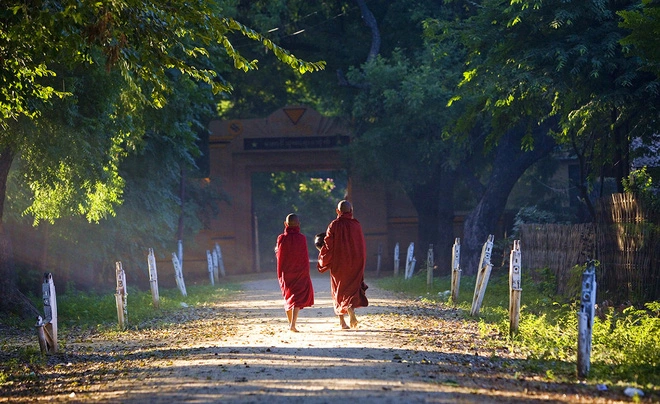The Buddha is a shining example of the importance of living in harmony with nature, often choosing to reside in the forest for meditation and spiritual purification. Most of the Buddha’s life was spent in remote and secluded forests, away from the dust and noise of urban areas.
Every day, he would walk and, when someone needed guidance, he would go and teach them. He also encouraged his disciples to go out and preach by using their own feet. Monks and nuns would often practice walking meditation in the early mornings in villages. The majority of the Buddha’s time was dedicated to meditation, as controlling the breath is a beneficial exercise for both physical and mental well-being.
Similarly, modern scientific research shows that individuals who practice meditation have their brain’s neural systems release hormones that promote inner peace, reducing stress and negativity.
On the other hand, when someone is in an unstable state of mind, various physical and mental changes occur in the body, leading to the risk of diseases in different organs such as the heart, liver, and kidneys. According to Traditional Chinese Medicine, this can harm organs like the liver, lungs, spleen, and kidneys.
At present, Western psychotherapists are also using meditation as a method to prevent, treat, and rehabilitate mental disorders.

In the past, during his 45 years of teaching along the banks of the Ganges River, the Buddha only used one means of transportation – walking. In the Sutras, it is mentioned that the Buddha was always in a state of meditation, so when he walked, he also meditated.
Walking can be another wonderful opportunity for practicing mindfulness. Each moment can enhance awareness and sometimes be an easier object of meditation than the breath.
In Buddhist philosophy, mindfulness is the state of being aware, paying attention to what is happening in the present moment, in a non-judgmental or comparative way. Walking meditation is considered one of the effective methods to practice mindfulness. This technique brings many benefits, helping the body feel balanced and serene, suitable for practice within the confines of one’s home during the pandemic.
A walking meditation can help you release intrusive thoughts, the noise that disturbs your mind, by immersing yourself in the beauty and simplicity around you, like observing the smallest, most lovely and peaceful details on a flowing stream. However, the most wonderful thing about walking meditation is that you can practice it anywhere.
Living with Optimism During Pregnancy: Strategies for Success
The importance of leading a balanced lifestyle during pregnancy cannot be overstated. Ensuring that the mother and unborn child get ample nutrition and emotional support, living an optimistic and positive life during this period can lead to a healthy and successful birth for the baby. Here’s what you need to know about maintaining an optimistic attitude throughout your pregnancy.
“8 Things You Should Avoid Saying During a Job Interview”
Job interviews often involve a delicate balancing act between being frank and being too blunt. While it is important for candidates to be honest and show their true personalities, too much candor could lead to them forfeiting prospective job opportunities. In an ideal world, both sides would be able to have open and honest discussions about the job, yet this is not always possible in reality.



































